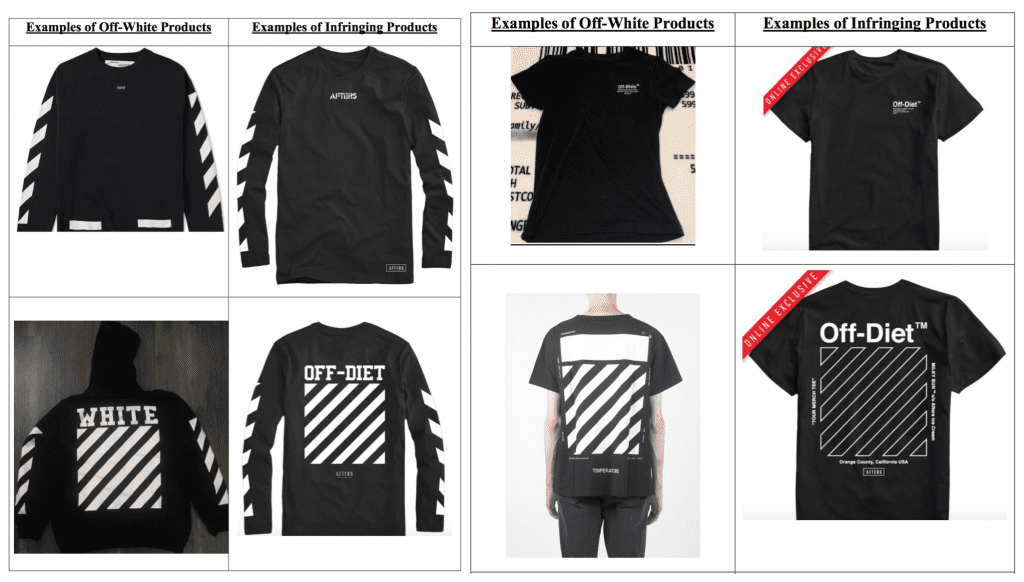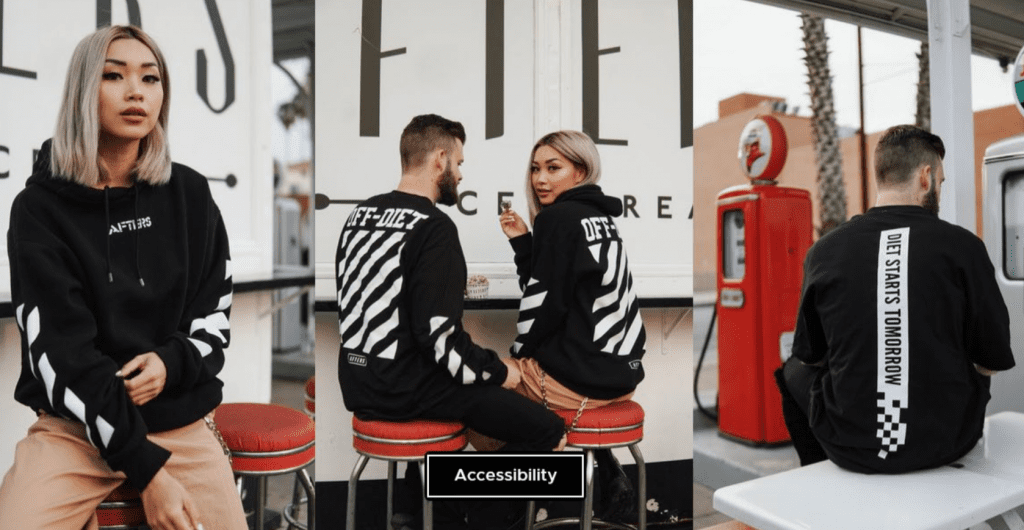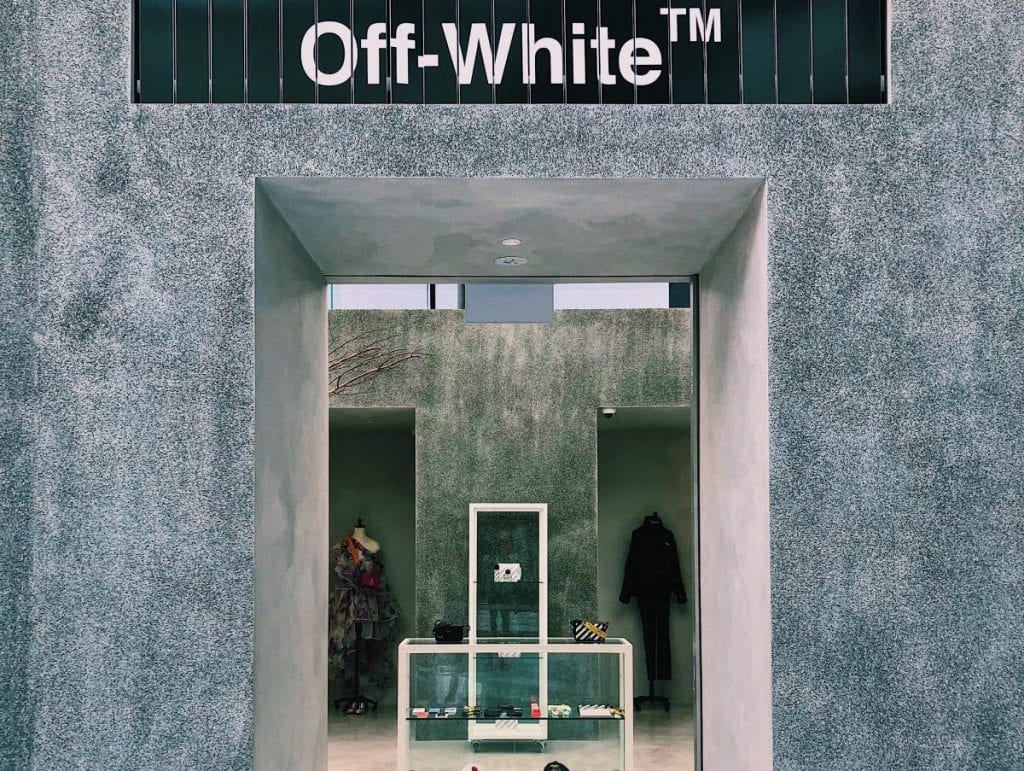Off-White is suing a California ice cream chain, arguing that the unrelated party has run afoul of the law by selling products that bear – and adorning its outposts with – marks that are “confusingly similar” to Off-White’s own well-known trademarks. In the complaint that it filed in a California federal court on Tuesday, Off-White claims that Afters Ice Cream (“Afters”) is offering up merch and using “retail fixtures, signage, [and] interior décor” that is meant to “confuse consumers into believing that [its] products are Off-White products and/or that [it or its] business is affiliated with Off-White” when there are no such ties between the two companies.
“The Off-White brand has been recognized for its distinctive graphic and logo-heavy apparel designs, including a unique design mark comprised of alternating parallel diagonal lines, which has been used on or in connection with Off-White products since at least as early as 2013,” Off-White asserts in its newly-filed complaint. As a result of its “use, advertising and promotion of” its graphic marks, including the aforementioned multi-diagonal stripe mark, as well as “the word-of mouth-buzz generated by its consumers,” Off-White alleges that its products and its various trademarks are “prominently placed in the minds of the public.”
With that in mind, Off-White claims that Afters – a premium handcrafted ice cream chain founded by Scott Nghiem and Andy Nguyen, both of whom have “a background in clothing and/or streetwear” – is piggybacking on the esteem and appeal of its brand by way of an array of “merch” offerings, namely t-shirts and sweatshirts, and decorative store elements that make use of diagonal stripe motifs and in some cases, other aspects of Off-White’s trademarks. By “manufacturing, advertising, marketing, promoting, distributing, displaying, offering for sale, and/or selling products” that make use of “one or more of Off-White marks,” and affixing “confusingly similar [or] identical” signage and interior decoration to its stores and pop-up outposts, Afters – which markets itself as “more than just ice cream” and as “a lifestyle,” per Off-White – is infringing the trademark rights that Off-White has amassed, Virgil Abloh’s company argues.
Off-White points to “significant common law trademark” rights for its name and various logo marks, and five federal trademark registrations for its “fifteen alternating parallel diagonal lines of varying sizes” marks – which are mostly registered for use on garments and accessories, but one of the registrations includes use in connection with “retail store services featuring apparel, footwear, fashion and clothing accessories,” among other things – as the basis for its claims.

Despite having “knowledge of Off-White’s ownership of its Off-White marks, of the fame and incalculable goodwill associated therewith, and of the popularity and success of the Off-White products,” Off-White contends that Afters adopted the lookalike branding “in bad faith,” and that such “unquestionable bad faith intent to trade off of Off-White’s goodwill is demonstrated by, among other things, [its] ubiquitous use of the infringing marks in connection with [its] business.” As a result and given the parties’ inability to resolve the matter among themselves on the heels of Off-White sending the ice cream company a cease and desist letter in June, counsel for Off-White asserts claims of trademark infringement, false designation of origin, and unfair competition.
Potential for Parody?
While it is not yet clear what – if any – arguments Afters will wage in its defense, there is a chance that the ice cream company has a parody argument to make when it comes to the allegedly infringing nature of its merch: parody. A potential defense to trademark infringement, parody has been defined as “a simple form of entertainment conveyed by juxtaposing the irreverent representation of [a] trademark with the idealized image created by the mark’s owner,” as a judge for the U.S. District Court for the Southern District of New York put it in the Louis Vuitton v. My Other Bag case, citing the U.S. Court of Appeals for the Fourth Circuit’s decision in Louis Vuitton Malletier S.A. v. Haute Diggity Dog, which was citing the 2001 decision from the Fourth Circuit in PETA v. Doughney. (Got that?)
In order to prevail on such a defense and sidestep infringement liability, the party that is engaging in the alleged parodic endeavor must generally show that: (1) it has used just enough of the original trademark to conjure up the original mark in the minds of consumers, and (2) its use of the mark is distinct from the original and is, instead, a parody, due to its communication of some articulable element of humor, satire, mockery, or commentary.
“This generally may be accomplished by relying on some difference between the way in which the two marks are being used” and the element of “’satire, ridicule, joking, or amusement’ that distinguishes them,” according to Brutzkus Gubner attorneys Jeffrey Kobulnick and Michael Bernet. “In other words, a parody clearly indicates to the ordinary observer ‘that the defendant is not connected in any way with the owner of the target trademark,’ while simultaneously ‘poking fun at [the] trademark or the policies of its owner.’”
In the case at hand, parody could be a relevant argument since Afters did not copy-and-paste the Off-White name and striped branding for its t-shirts and sweatshirts on its own; it has included some additional elements.

For instance, instead of using the full Off-White name on one of its t-shirt styles along with the diagonal stripe square, the Afters garments read, Off-Diet, a seeming play on the calorie count of ice cream. It has taken similar light-hearted jabs at other buzzy brands – from Anti Social Social Club (its version is “Anti Diet Diet Club”) to Kanye West’s Sunday Service, complete with “Ice Cream is King” and “Sundae Service” taglines.
Such a potential argument would come amid a larger parody fight in light of the U.S. Court of Appeals for the Ninth Circuit’s decision in the trademark infringement and dilution case that Jack Daniel’s filed against dog toy-maker VIP Products LLC for hijacking the liquor company’s trade dress and bottle design for a chew toy bearing the name “Bad Spaniels.” On the heels of the U.S. District Court for the District of Arizona finding for Jack Daniel’s on all claims and entering a permanent injunction in its favor, the Ninth Circuit concluded that the Bad Spaniels toy was an expressive work entitled to First Amendment protection. In a decision from March 2020, the Ninth Circuit held that while VIP Products used Jack Daniel’s trademarks to sell its dog toys, the “humorous message” conveyed by the toy makes the use “expressive” and protected under a heightened First Amendment standard as a result.
Jack Daniel’s has since sought Supreme Court intervention, pointing to mixed treatment by lower courts of trademark infringement claims involving the use of famous marks on commercial products in a “humorous” capacity. In its September 15 certiorari petition, Jack Daniel’s asks the nation’s highest court to determine “whether a commercial product using humor is subject to the same likelihood-of-confusion analysis applicable to other products under the Lanham Act, or [whether it] must receive heightened First Amendment protection from trademark-infringement claims, where the brand owner must prove that the defendant’s use of the mark either is ‘not artistically relevant’ or ‘explicitly misleads consumers.’”
As for Off-White, the case shows that it is hardly just amassing dozens of trademark registrations for its word mark, various stylizations of its name (and in some cases, stylizations of the word “Off” on its own), and diagonal stripe logos, it is actually taking action against allegedly infringing uses of those sometimes-unconventional marks. In the matter at hand, it is seeking injunctive relief to bar Afters from continuing to engage in such allegedly infringing conduct, and “an award of [Afters’] profits, and damages in an amount to be proven at trial for willful trademark infringement of [its] federally registered Off-White marks.”
A rep for Afters did not immediately respond to a request for comment.
*The case is Off-White LLC v. Afters Ice Cream, Inc., 8:20-cv-02121 (C.D.Cal.).











